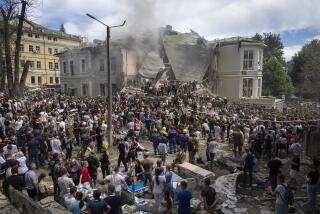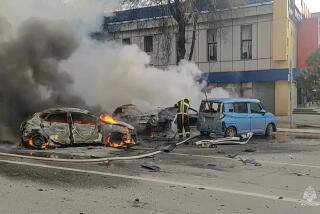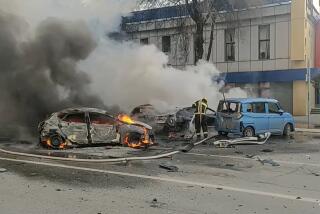Airstrikes Jar Kosovo Capital Much of Night
PRISTINA, Yugoslavia — The first explosion shook this city at 8 p.m. Wednesday, and a bright orange flash about a mile away was visible from downtown Pristina, Kosovo’s provincial capital.
A second blast followed minutes later. An ambulance rushed toward the scene with its blue emergency lights flashing. And at 8:10, the whole city went pitch black, and deadly silent, at once.
As Yugoslav troops braced for more attacks, they searched the night sky with the beam of a single searchlight, while intermittent tracer fire cut yellow arcs through the darkness.
Armored military police vehicles rolled down one of the deserted main streets with a dozen soldiers crammed into each one, watching the surrounding buildings, ready to fire their assault rifles.
And then, for the next several hours, explosions could be heard on Pristina’s southeastern outskirts, rattling windows as more of the sky turned orange. Flying sparks suggested that arms caches may have been hit, and it was unclear if various sustained explosions were due to continued attacks or to the ignition of ammunition.
By 11:45, two blasts had rocked the Marshal Tito Army Barracks to the west, one of the largest such military compounds in the province, and it appeared entirely on fire. The light from the blaze and the fireballs it was throwing could be seen reflected in apartment windows in the city.
Much of the armor stored in the barracks compound had already been moved to other sites in Kosovo, so it was impossible to immediately gauge the damage done to the Serbian arsenal.
When dawn broke today to the sound of intermittent antiaircraft fire, the barracks was still ablaze. A thick column of black smoke was rising from the flames and drifting over the city. The streets, usually full of early morning crowds, were deserted.
Early Wednesday morning, Serbian forces had moved a large number of tanks and other armored vehicles out of Pristina, residents said. The tanks headed toward Vucitrn, one of three fronts in the Serbian offensive.
Thus began the air assault that the North Atlantic Treaty Organization had long been threatening as Yugoslav President Slobodan Milosevic repeatedly refused to make a deal for peace in Kosovo, a southern province of Serbia, the dominant of Yugoslavia’s two republics.
Before nightfall, Serbian civilians could be seen roaming the streets. Kosovo’s ethnic Albanians, who make up 90% of the province, have suffered so many massacres that they have no doubt Serbs may attack them again while NATO warplanes are high overhead.
In Pristina, ethnic Albanians had tried to set up an early warning system for Serbian attacks on their neighborhoods by calling one another on cellular phones to make regular checks for trouble.
But the phone network crashed with the first explosions, leaving terrified residents in the dark and wondering what might come next.
Fear of revenge killings weighed heavily on Armend Ramadani’s mind as he waited Wednesday for a bus to Yugoslavia’s southern border, to see whether he, his brother and a friend with her three young daughters could escape into neighboring Macedonia.
“NATO bombs will not do any harm to us, but the civilians. . . ,” Ramadani said, and his voice trailed off because there were Serbs standing nearby, waiting for the same bus.
After letting in about 10,000 Kosovo refugees over the previous few days, Macedonia closed its border and then reopened it Wednesday, and Ramadani didn’t know if it would be closed again by the time his bus arrived.
By the time the first airstrikes hit Pristina, there had been several false alarms Wednesday when the wail of air raid sirens sent many people in the streets running for cover.
All but a few Serb-owned shops were closed during the day, and there were lines outside bakeries and grocery stores as people stocked up on bread, milk and other essential supplies in case it would not be safe to leave home over the coming days.
Foreign peace monitors and aid workers had pulled out of Kosovo over the past several days, fearing that NATO’s airstrikes might provoke attacks against the few foreigners still here. Most of those remaining were journalists.
The Office of the U.N. High Commissioner for Refugees was one of the last organizations to pull out its foreign staff Tuesday amid one of the largest exoduses of refugees in a year of fighting in Kosovo.
As about 25,000 refugees fled a Serbian offensive, and whatever NATO’s attack might bring, only three local staff members were left in the U.N. agency’s Pristina office, and it had given up trying to deliver relief in the countryside.
“Obviously, it’s going to be a tragedy for those people, especially those people who are on the move with no assistance out there,” Fernando del Mundo, the U.N. agency’s spokesman, said by phone from Macedonia.
The agency’s headquarters ordered its foreign aid workers to leave Kosovo. But in any case, Serbian security police were denying them access to the refugees who needed the most help, Del Mundo said.
“It’s been very difficult over the last few days,” he said.
Kosovo Albanians who run the Mother Teresa Humanitarian Society here did what they could to find the refugees rooms in schools or local homes, but many of those were already full after a year of conflict.
* UNCERTAINTY AMONG ALLIES
NATO is jittery as it begins biggest combat operation. A17
* CLINTON MAKES HIS CASE
President cites U.S. interests, values in defending raids. A17
* GRAPHICS, PHOTOS: A16-20
More to Read
Sign up for Essential California
The most important California stories and recommendations in your inbox every morning.
You may occasionally receive promotional content from the Los Angeles Times.










